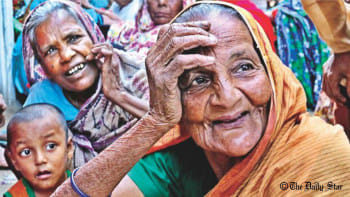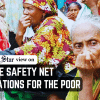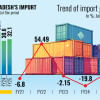How the FY2025 budget can address our economic challenges

Bangladesh's economy is currently grappling with various difficulties, such as high inflationary pressure, low investment, increased debt servicing liability, slow growth in the external sector, depletion of foreign exchange reserve, a weak financial sector, slow growth, unemployment, and inequality. Amid such a challenging domestic and external economic landscape, the new finance minister will present the national budget for 2024-25 fiscal year in the first week of June.
The budget will have to address some of the immediate challenges through budgetary allocations and fiscal measures. Though a budget is prepared for one fiscal year, it is the vehicle that materialises the government's economic policies and political vision. Therefore, the upcoming budget will play a significant role in addressing immediate issues such as protecting the poor, low-income and lower-middle-income families, and short- to medium-term issues such as achieving higher economic growth and reducing inequality. Unfortunately, the budget's role in addressing these issues has been limited so far. In view of the current economic difficulties, the FY2024-25 budget should consider four broad areas.
Firstly, the government should follow fiscal prudence by increasing revenue mobilisation, rationalising public expenditures, and improving the quality of expenditures. Traditionally, the budget deficit is set around five percent, which is not met in most cases, while the actual deficit remains lower than projected. In FY2023-24, budget deficit was projected at 5.2 percent. However, given high inflation, low fiscal space, and the pressure on balance of payment, budget deficit in the upcoming fiscal year should be lower. Currently, the government is heavily borrowing from the banking sector to meet its budget deficit. Even though there is not much demand for bank loans from the private sector right now, the government's interest payment against bank loans will increase. Hence, a pragmatic fiscal consolidation is needed through restrained spending and higher tax collection.
Of course, reduced government spending and increased tax could hurt people. This can be minimised through effective measures. Our tax collection is far below the optimum levels due to a narrow tax net, widespread tax evasion, and illicit financial flows out of the country. According to finance ministry data, the tax-GDP ratio was only 7.3 percent while revenue-GDP ratio was 8.16 percent in FY2023. On the other hand, the government faces resource constraints due to unproductive expenditures, subsidies, and various tax exemptions provided to several sectors.
On the whole, the budget for FY2025 should adopt a balanced approach to address economic slowdown and inflationary pressure through judicious fiscal consolidation and support to the vulnerable people. Of course, implementation of the budget will have to be ensured through strengthening the governance of the institutions entrusted with the responsibility of spending public money.
In the current economic circumstances, prioritisation of public investment projects is needed—only projects with high returns and employment creation potential should be continued. The government has incurred huge financial losses due to high capacity payments to independent power plants (IPPs) for several years. The economy is burdened with a subsidy as high as 1.9 percent of GDP. The current pattern of subsidies provided to various sectors is a waste of the precious resources of the country, yet subsidy management has not been in the government purview. The FY2025 budget should only allocate subsidies for the agriculture sector since this is connected to the food security of the country.
The second consideration for the next budget should be enhanced spending for the social sector. The government has been investing on physical infrastructure—such as transportation and communication, and energy and power—since it is an important driver of economic growth and employment generation. In the current budget (FY2024), allocation for these two sectors account for 45.8 percent of total allocation under the Annual Development Programme (ADP). However, social infrastructure such as education and healthcare are acutely underfunded.
Just to remind ourselves, in the FY2024 budget, allocation for education and health was 1.76 percent and 0.76 percent of GDP, respectively. The notion that development is possible only through investment into physical infrastructure is wrong. Expenditure on education, research and innovation, skills development, and health is also necessary since it is the people who propel development through their talent and hard work. Therefore, for a prosperous and an inclusive society, social sectors must receive higher allocation. To do so, there should be prioritisation and rationalisation of spending as the fiscal space of the government is narrow. In order to reduce poverty and inequality, support for the low and middle-income households must be enhanced, both in terms of higher funds and coverage of the beneficiaries.
In the current budget, the government increased the threshold level of tax-free annual income from Tk 3 lakh to Tk 3.5 lakh. Given high inflation during the last two years and no increase of wages and salaries to match inflationary pressure, the threshold of tax-free income should be increased further to Tk 5 lakh. If tax evasion is curbed and new sources of tax collection are explored, combined with prudent use of resources, this will not create any pressure on the budget.
Additionally, small businesses have to be provided with finance on easy terms. Unfortunately, the banking sector is burdened with non-performing loans (NPLs) due to large loan defaulters, while small businesses are deprived of finance since banks are apprehensive to lend them.
The third area of focus should be on green transition of the economy by higher and strategic allocation both for adaptation and mitigation measures. A large part of climate-change-related resources has to be secured from international sources. However, the budgetary allocations should also be increased. The targets for emissions reduction in the nationally determined contribution (NDC) have to be achieved through both domestic resources and external support. Green financing mechanisms for sustainable infrastructure projects can be explored. To meet the voluntary climate goals made by the government, increased allocations for renewable energy is needed, which is quite low at present. For example, in the FY2024 budget, only 2.4 percent of the ADP allocated for the whole power and energy sector was for renewable energy.
The fourth area is institutional strengthening for budget implementation. The budget has to clearly spell out how the budgetary measures will be implemented. The lower implementation of the development expenditure reflects the government's limited utilisation capacity. The ADP target is adjusted downwards every year. Till March 2024, the ADP implementation has been only 42.3 percent, which implies that in the next three months, the implementation has to be at 57.7 percent. Over the years, the size of ADP has consistently ranged around five percent of GDP, which is inadequate for a country that needs substantial investment in development. Indeed, public investment has recently been declining, though it was on an increasing trend for a few years. In FY2023, public investment declined to 6.77 percent compared to 7.53 percent in FY2022. This low level of public investment hampers private investment and discourages foreign investment. Private investment has remained stagnant around 24 percent of GDP for several years. Foreign direct investment (FDI) has remained less than one percent of GDP for a long time. However, as has been mentioned above, in case of public investment, a cautionary approach must be followed.
On the whole, the budget for FY2025 should adopt a balanced approach to address economic slowdown and inflationary pressure through judicious fiscal consolidation and support to the vulnerable people. Of course, implementation of the budget will have to be ensured through strengthening the governance of the institutions entrusted with the responsibility of spending public money.
Dr Fahmida Khatun is executive director at the Centre for Policy Dialogue (CPD) and non-resident senior fellow of the Atlantic Council.
Views expressed in this article are the author's own.
Follow The Daily Star Opinion on Facebook for the latest opinions, commentaries and analyses by experts and professionals. To contribute your article or letter to The Daily Star Opinion, see our guidelines for submission.

 For all latest news, follow The Daily Star's Google News channel.
For all latest news, follow The Daily Star's Google News channel. 













Comments